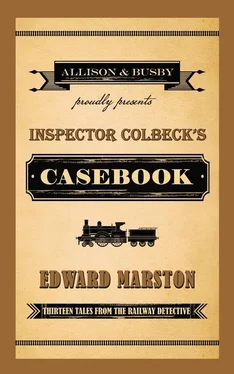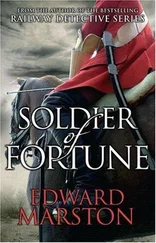Edward Marston - Inspector Colbeck's Casebook
Здесь есть возможность читать онлайн «Edward Marston - Inspector Colbeck's Casebook» весь текст электронной книги совершенно бесплатно (целиком полную версию без сокращений). В некоторых случаях можно слушать аудио, скачать через торрент в формате fb2 и присутствует краткое содержание. Год выпуска: 2014, ISBN: 2014, Издательство: Allison & Busby, Жанр: Исторический детектив, на английском языке. Описание произведения, (предисловие) а так же отзывы посетителей доступны на портале библиотеки ЛибКат.
- Название:Inspector Colbeck's Casebook
- Автор:
- Издательство:Allison & Busby
- Жанр:
- Год:2014
- ISBN:9780749014742
- Рейтинг книги:4 / 5. Голосов: 1
-
Избранное:Добавить в избранное
- Отзывы:
-
Ваша оценка:
- 80
- 1
- 2
- 3
- 4
- 5
Inspector Colbeck's Casebook: краткое содержание, описание и аннотация
Предлагаем к чтению аннотацию, описание, краткое содержание или предисловие (зависит от того, что написал сам автор книги «Inspector Colbeck's Casebook»). Если вы не нашли необходимую информацию о книге — напишите в комментариях, мы постараемся отыскать её.
Inspector Colbeck's Casebook — читать онлайн бесплатно полную книгу (весь текст) целиком
Ниже представлен текст книги, разбитый по страницам. Система сохранения места последней прочитанной страницы, позволяет с удобством читать онлайн бесплатно книгу «Inspector Colbeck's Casebook», без необходимости каждый раз заново искать на чём Вы остановились. Поставьте закладку, и сможете в любой момент перейти на страницу, на которой закончили чтение.
Интервал:
Закладка:
A holiday was a rare event in the life of a detective inspector. Colbeck was so committed to his job that he sometimes deliberately chose not to take time off owed to him. Under pressure from Madeleine, however, he did agree to have a free weekend and he put himself completely at her disposal.
‘Where would you like to go?’ he asked.
‘That depends on how far you’re prepared to take me, Robert.’
‘I’d take you to the ends of the earth — provided that I can be back at work on Monday morning, that is. Give me a destination and the matter’s settled.’
‘Very well,’ she said, decisively. ‘I want to go to Northumberland.’
He was astonished. ‘ Northumberland? ’
‘I even took the trouble to look at the train timetables.’
‘But why on earth do you want to go there, Madeleine?’
‘I’d like to make sketches of Puffing Billy. ’
‘Ah, I see — it’s a working holiday.’
‘Father has been badgering me to paint locomotives from earlier days to show how far they’ve evolved. For some reason, I have a yearning to see Puffing Billy . It would take us back over forty years.’
‘I know,’ he said, ‘but it’s a working engine at Wylam Colliery and there are other versions of the original design now in operation there. We can’t just barge into a coalfield and expect them to let you sit there and draw.’
‘That’s why I took the liberty of writing to the mine manager, Robert. I didn’t want to go all that distance in order to be turned back. Mr Hooper’s letter arrived this morning. He’s more than ready to let me do some drawings of Puffing Billy .’
‘In that case, Wylam it shall be,’ he said, impressed by his wife’s initiative. ‘It will be so restful to travel incognito, so to speak, and to go on a train journey as just another passenger. That will be a luxury.’
‘I’m afraid not,’ she said, apologetically. ‘The manager recognised the name of Colbeck. That was why he was so keen to give me free access.’
He was flattered. ‘Has my fame spread that far?’
‘Not exactly, Robert.’
‘But you just said that the manager recognised my name.’
‘I said that he recognised the name of Colbeck, but not because you happen to be the Railway Detective. He’s probably never heard of you. It wasn’t your name that he knew — it was mine.’
‘Oh!’ Colbeck was taken aback.
‘Apparently, he has a friend in Newcastle who bought one of my very first paintings — the Lord of the Isles . The manager liked it so much that he remembered the name of Madeleine Colbeck. So you’ll get your wish, after all,’ she said, beaming. ‘You can travel anonymously because nobody in Northumberland will have a clue as to who you are.’
Colbeck was unsure whether to be annoyed or gratified. For once in his life, he would have to take second place to Madeleine. His momentary irritation vanished. Loving his wife too much to begrudge her any fame, he burst out laughing and enfolded her in his arms.
Most people would have been daunted by the prospect of a journey north of almost three hundred miles but they were relishing it. Setting off from London on a Friday, they would have three whole days alone together, returning late on Sunday evening. They climbed aboard the train with anticipatory delight. Colbeck loved rail travel because there was always something of interest to see out of the window. He was sufficient of a romantic to bemoan the encroachment of industry on the countryside and sufficient of a realist to accept the need for progress. Critics argued that the advent of railways ruined some of the most beautiful landscape in England but Colbeck believed that the advantages outweighed the disadvantages. Those who toiled in factories, forges, mines and mills had hitherto been imprisoned throughout the whole year in their grim, unforgiving, smoke-filled environments. Thanks to the railway system, they could now catch a train to take them into the country or off to the seaside. Their horizons had been widened in every way.
There were several stops on the way, enabling Colbeck and Madeleine to get out and stretch their legs on the platform. Each new section of the journey provided fresh delights. As they sped through Hertfordshire, Huntingdonshire, Lincoln and Yorkshire, they were reminded that — for all its aggressive industrialisation — England was still very much a place of rural splendour.
‘We are going to the capital of the coal industry,’ said Colbeck.
‘Do you have any objection to that?’
‘Not if it’s what you want, Madeleine — though I expect to spend a lot of time brushing dust off my clothing. I think that there are fifty coalfields in the vicinity of Newcastle.’
‘I hope we have time to explore the city itself,’ she said. ‘It isn’t just an industrial centre. There are some wonderful sights, apparently.’
‘I know,’ he said, grinning. ‘I’m sitting opposite one of them.’
It was early evening by the time they finally reached Newcastle. After booking a room at the Railway Hotel, they set off to explore the city. Nestling around the River Tyne, it had a great deal to offer to visitors. Intriguing remains of Roman occupation were cheek by jowl with more recent buildings, many of them built of granite. It was well laid out and able to accommodate over a hundred thousand inhabitants. The bracing walk was an ideal antidote to the hours spent on the train. They were particularly impressed by the Exchange, with its three Corinthian porticoes, and by the Post Office, Market, Hall of Incorporated Trades and Theatre Royal. Here was a vibrant city that bristled with civic pride.
Dinner at the hotel was surprisingly good and they ate heartily, savouring the pleasure of being on holiday and wishing that they could spend more time together. After a comfortable night, they had an early breakfast then caught a train on the Newcastle and Carlisle Railway. It chuffed along happily for ten miles or so then deposited them at Wylam, a village known to both of them as the birthplace of George Stephenson, one of the greatest pioneers of rail travel. What had once been a little farming community was now a sprawling coalfield with all the attendant grime and clamour. A trap took them to the colliery offices where they met Seth Hooper, a strapping man in his fifties with a craggy face whose dominant feature was a large, square chin. When introductions were made, he was distantly polite to Colbeck, reserving his interest for Madeleine.
‘I couldn’t believe that a woman had painted the Lord of the Isles ,’ he said.
‘My wife has painted several locomotives,’ said Colbeck, proudly.
‘And she’s done so with great skill, sir. I know that we have female artists of undoubted ability but how many of them find inspiration in the railway system?’
‘Madeleine is unique in every way.’
‘Any more of this undeserved praise,’ said Madeleine, ‘and you’ll have me blushing. I don’t see myself solely as an artist. I’m also a recording angel of the rail network. Even in the short time I’ve been at my easel, there have been radical changes and improvements.’
‘ Puffing Billy will certainly take you back in time,’ said Hooper.
‘That was its appeal.’
‘It’s a pity that William Hedley is no longer alive. He’d have been thrilled to discover that the locomotive he designed has attracted the interest of a celebrated artist from London.’
Madeleine laughed. ‘I’m not that celebrated, Mr Hooper,’ she said, modestly. ‘In some ways, I’m still very much a beginner.’
‘It’s a privilege to welcome you, Mrs Colbeck, that’s all I know.’ He gestured towards the engine shed. ‘Let me take you to meet Puffing Billy .’
Читать дальшеИнтервал:
Закладка:
Похожие книги на «Inspector Colbeck's Casebook»
Представляем Вашему вниманию похожие книги на «Inspector Colbeck's Casebook» списком для выбора. Мы отобрали схожую по названию и смыслу литературу в надежде предоставить читателям больше вариантов отыскать новые, интересные, ещё непрочитанные произведения.
Обсуждение, отзывы о книге «Inspector Colbeck's Casebook» и просто собственные мнения читателей. Оставьте ваши комментарии, напишите, что Вы думаете о произведении, его смысле или главных героях. Укажите что конкретно понравилось, а что нет, и почему Вы так считаете.












